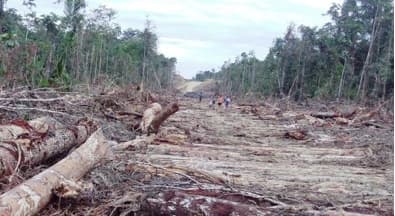People and forests of Papua New Guinea under threat: the government’s failed response to the largest land grab in modern history
Despite public statements to the contrary, the PNG government is failing to take meaningful action to address the SABL crisis that is harming its people and environment…
Source: Global Witness via PNGExposed
Summary

Photo: Logging road – Bewani SABL (Global Witness)
Three years after an independent investigation was launched to look into alleged fraud and illegality surrounding the widespread issuance of Special Agricultural Business Leases (SABLs) covering roughly 12% of Papua New Guinea’s total land area, the government has taken no meaningful action to defend its citizen’s rights to their land and halt the wholesale destruction of rainforests of global importance.
In this briefing, we explain the following issues that need to be urgently addressed:
- Government inaction – The PNG government has failed to stop any logging operations under SABLs even where an official investigation recommended the SABL be cancelled.
- Breakdown in law and order – Logging and exports continue unabated and with the support of local police and forest authorities in the one operational SABL the government has cancelled.
- Failure to complete SABL review – More than three years after committing to review the legality of SABLs, around 40% have not been reviewed, including the three largest timber exporting operations.
- More logging authorized – The National Forest Board continues to issue and renew permits to log and clear rainforest under SABLs, ignoring community complaints and the government’s own decision to repeal the SABL mechanism.
- Timber grabbing – Many SABLs have been used for industrial logging rather than their intended purpose to promote agricultural development, with SABLs now accounting for nearly a third of the country’s total log exports with an export value of roughly US$100 million a year.
- Total impunity – No government offiicials or companies involved in the abuse of SABLs have been prosecuted or sanctioned where evidence of criminality or negligence was uncovered by an official investigation.
Conclusion
Despite public statements to the contrary, the PNG government is failing to take meaningful action to address the SABL crisis that is harming its people and environment.
As outlined in this brief, it is imperative that the government implement the recommendations coming out of the Commission of Inquiry’s two year investigation into the SABLs and ensure that its decisions are being enforced on the ground.
It must initiate appropriate measures to hold government officials and companies to account for violating PNG laws, including prosecutions where there is evidence of criminal activity.
And critically, it must expedite an independent and transparent review process of the remaining SABLs and take swift action to protect the rights of its indigenous landowners and prevent further harm to the livelihoods of its citizens and the natural resources they depend on.
